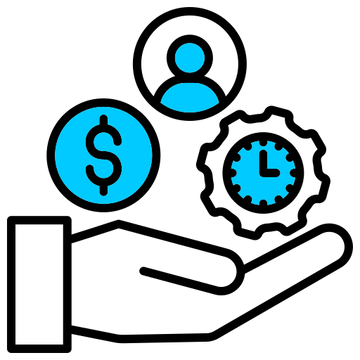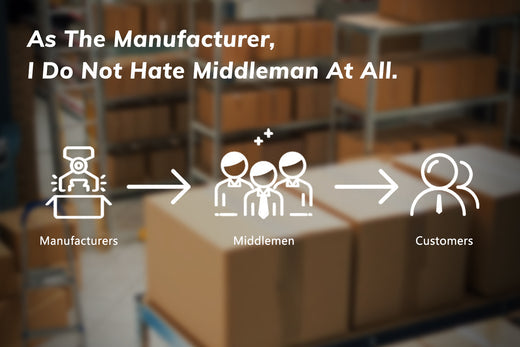

Removable Film Labels
Written by: Beichen Lu
|
|
Time to read 4 min
I guess many of you have heard this: "Cut out the middlemen."
The retailer said, “A phone case sold for $10 in the USA but only costs $2 in China.” Those greedy middlemen take $8, resulting in a 400% profit rate.
Manufacturers said, “We earn $1 per piece, but those god-damn middlemen procure and sell to retail stores for $3 per piece. They make most of the money. That’s disgusting!
If it weren't for these middlemen making a profit at both ends, we sellers could have earned more, and buyers could have bought things more affordably.
But is that true?
As manufacturers, we need to work with middlemen frequently. Are these middlemen who get a profit margin really bad? If there are no middlemen taking money, is it really good for us?
Not necessarily. Let me tell you what’s going on.
Table of Content
You all get familiar with telling your customers what your product is, how your product is like, and why they should choose you. But many B2C product pages actually do really bad on this. Those operation people or content creators only tell product features but no product benefits. That’s totally wrong. You need to realize that customers care about benefits they get from your product, not features.
Let's take it from an example. The 360° Camera on your sedan—this is the product feature. The 360° Camera helps you park safely, confidently, and accurately in any complicated, crowded urban area, like the roadside in Manhattan or the challenging uphill areas in San Francisco. You never need to carefully maneuver your sedan back and forth, enduring the annoying, continuous honking from drivers blocked by you.
This is the product benefit of the 360° Camera. You need to tell your customers what benefit your product will provide to them and why this feature is worthy of investment. Don’t let them explore it themselves because they are busy. Some of you may say people with experience will realize that without your notification. That’s correct! But what about potential customers who do not know how to drive yet? What about people planning to go to New York City but are unaware of how challenging parking can be?
Are you going to ignore them? Remember, the fundamental way of making a profit in business is satisfying your customer’s needs at a suitable price. Tell your customers how your product satisfies their needs directly. Don’t just list several features and let them guess. They are all very busy now, so save their time and let them know your product benefits in a short time.
But what if Mike chose option 2, to "Ask middlemen"?
All he needs to do is send all requirements to several middlemen. "I don’t care if any single supplier is more affordable or another single supplier ships fast. I make the decision, but middlemen do all the other jobs." Mike only needs to make the choice of several different suppliers with all the details because the middlemen who have been in the label industry for many years must have many more suppliers than Mike. And Mike can repeat those easy processes for all his other procurement tasks. These middlemen know how to analyze and choose suppliers more than Mike, who is just new to this industry. That’s why those large-sized companies’ procurement teams still work with middlemen instead of working with manufacturers directly. Middlemen make money not just from the price difference; the main job is to help you cover the complexity of suppliers.
But what if the products I am going to procure are very simple and concentrated?
Good question. Then here is the second advantage of middlemen.
If a product is simple, it means that anyone can produce it, so only a few large factories are able to compete and survive in this market. Take, for example, copy paper. When I helped my client source 20lbs copy paper, I discovered that there were only 30-plus verified factories on Alibaba.com, unlike some other industries that have 500+ suppliers. Many of these factories require a minimum order quantity of 1 container, and there is at least a 40% margin difference between small orders (1 container) and large orders (4 containers).
So, you face two main challenges when sourcing simple and concentrated products:
Minimum Order Quantity
Higher Prices for small quantity orders
What are you going to do? Order several times the planned inventory to meet the minimum order quantity requirement? Nobody wants to end up with overstock that may take up too much space, incur high warehouse storage fees, or negatively impact cash flow. Even if you reach the minimum order quantity, the price will still be higher compared to others.
So, you may consider finding a middleman like a distributor or trader who can combine many small orders like yours into a large order to negotiate with factories. The middleman takes a 30% margin from that 40%, leaving you with 10%. Not only do you avoid the need to order in large quantities, but you also get a 10% discount.
This is how a middleman helps your business even when your target procurement industries are simple and concentrated.
It is said that it's best to "cutting out the middlemen."
However, the 24-hour 7.11 near your home observes your needs every day, selects cost-effective products for you, and keeps stocking and organizing 24/7, so you can buy whenever you want, even at 3 a.m. So what is the value of middlemen?
They shield you from the complexity of dealing with hundreds of suppliers.
They help you meet the minimum order quantity requirement and provide discounts.
They guarantee the safety and quality of your procurement.
They reduce your cost and increase your efficiency.
What is reduced is your transaction cost, lowering your price and risk, and saving your time.
What is increased is your connection efficiency, making sellers, buyers, and everyone in the entire business circle worry less.
They help sellers and buyers reach an agreement. As a manufacturer, I don’t hate middlemen at all.
If you want to buy thermal labels or sticker paper, you can check out more on our store
Products Featured In This Blog

24/7 support team

Multiple Payment Methods

Worry-free shopping

Delivery in 3-7 business days
Be the first to know about label discounts,
product launches, and time-saving tips — subscribe now!
Are you 18 years old or older?
Sorry, the content of this store can't be seen by a younger audience. Come back when you're older.
They are exactly what I need, very easy to use!!!
Everithing was really good, fast delivery, product quality 100% guarantee
Very versatile label for mailing addresses and a marketing to promote a product or get someone’s attention.
Brother DK-2205 Compatible Continuous Labels 2.4" x 100'
Great little labels to use in pricing jewelry. Saves a lot time when you use with a thermal printer. I use on the hang tags and other display cards. Will definitely reorder in the future.
The label is perfect it's very recommended to everyone
iLabel 4x6 Thermal Shipping Label Printer Bluetooth Wireless
Dymo 30256 Removable Film Waterproof Shipping Labels 2-5/16” x 4”






